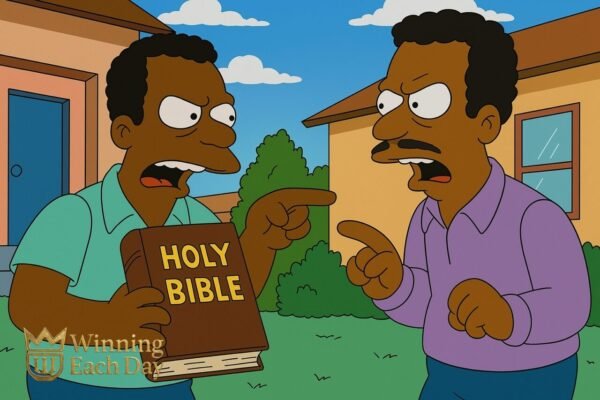|
LISTEN TO POST:
|

What Do We Mean By Personal Conviction?
We must learn to pursue our personal convictions in life. For a Christian, personal convictions are the deep-seated beliefs, values, and passions that we hold because of our interactions with God through the Scriptures, meditation, and prayer. As Paul indicated “… faith comes by hearing, and hearing by the word of God.” 1Romans 10:17, NKJV (see What It Means To Have Faith) Indeed, focusing on God and His Word opens us to new ideas and realities that can shape our personal convictions. Hence, Paul’s encouragement to set our minds on heavenly realities 2Colossians 3:2, NKJV.
Also, prayer shapes our personal convictions 31 Thessalonians 5:17, NKJV (see Never Stop Praying). The more we fellowship with God through the Scriptures, prayer, and meditation, the clearer the things that He lays on our hearts to pursue in life become. Through living out our personal convictions, we can pursue the things that God has designated to bring purpose to our lives. Therefore, following the things that God has laid on our hearts must be important to us if we are to live fulfilled lives.
Having personal convictions will guide our path and help us stay focused in life. It will help us to surround ourselves with people who share our deep-seated beliefs, values, and passions and they will encourage and support us all the way. We must, however, bear in mind that in our attempt to pursue our personal convictions in life, others can discourage us. Their discouraging attempts may stem from the fact that they cannot understand our vision or perceive what we have believed. We must not hesitate to stay away from such people, regardless of who they are. Let’s look at some cases of individuals who had personal conviction in the Bible.
Ruth Stays with Naomi, Becomes King David’s Great Grandma
But Naomi said, “Turn back, my daughters; why will you go with me? Are there still sons in my womb, that they may be your husbands? But Ruth said: “Entreat me not to leave you, Or to turn back from following after you; For wherever you go, I will go; And wherever you lodge, I will lodge; Your people shall be my people, And your God, my God. Where you die, I will die, And there will I be buried. The LORD do so to me, and more also, If anything but death parts you and me.” When she saw that she was determined to go with her, she stopped speaking to her. Now the two of them went until they came to Bethlehem. And it happened, when they had come to Bethlehem, that all the city was excited because of them; and the women said, “Is this Naomi?”
Ruth 1:11, 16-19 (New King James Version)
Naomi, a widow, had two sons who died, leaving two daughters-in-law behind. As she had no more sons to cover her daughters-in-law, she asked them to return to their relatives. In fact, she did her best to convinced them to leave because she was too old to give birth to more sons. One of the two in-laws called Orpah saw the merit in what Naomi said and went back to her relatives. She was convinced to go back home after she heard Naomi. On the other hand, Ruth, the other in-law, refused to return to her relative despite Naomi’s advice. Rather, she chose to stay with Naomi. The point is, why would Ruth opt to stay with her mother-in-law after being advised to go back to her family?
She had the personal conviction to stay with Naomi, and that was it! Naomi had to accept that because, regardless of her persuasion, Ruth would simply not go away like Orpah. Please remember that Ruth was a Moabitess and perhaps had learned how to interact with the God of Israel through her marriage to the family of Naomi. When you have a personal conviction, no amount of sound reasoning can overcome you. Eventually, through the counsel of Naomi, Ruth had the opportunity to be married to Boaz, who was a relative of Naomi’s. Later, Ruth gave birth to Obed, who became the father of Jesse. Jesse became the father of King David. Ultimately, Jesus Christ came from the lineage of King David. Ruth lived a fulfilled life because she followed her conviction to stay with Naomi.
David’s Conviction Helps Him Overcome Eliab and Defeat Goliath
And David said to the men who stood by him, “What shall be done for the man who kills this Philistine and takes away the reproach from Israel? For who is this uncircumcised Philistine, that he should defy the armies of the living God?” And the people answered him in the same way, “So shall it be done to the man who kills him.” Now Eliab his eldest brother heard when he spoke to the men. And Eliab’s anger was kindled against David, and he said, “Why have you come down? And with whom have you left those few sheep in the wilderness? I know your presumption and the evil of your heart, for you have come down to see the battle.” And David said, “What have I done now? Was it not but a word?” And he turned away from him toward another, and spoke in the same way, and the people answered him again as before. When the words that David spoke were heard, they repeated them before Saul, and he sent for him. And David said to Saul, “Let no man’s heart fail because of him. Your servant will go and fight with this Philistine.
1 Samuel 17:26-32 (New King James Version)
David, a shepherd boy who became the greatest King of Israel, had the conviction that he could defeat Goliath, an uncircumcised Philistine giant. His conviction made him ask questions about the reward that was at stake—he wanted to be sure of the reward that would be given to the person who would kill Goliath. When Eliab heard that David was asking questions about the reward, he was annoyed with him. He interpreted David’s curiosity as pride. David saw himself as a giant killer, but Eliab couldn’t see that possibility. Eliab couldn’t comprehend why David would be asking questions about the reward for the person who would kill Goliath. After all, King Saul, who was supposed to lead them in this battle, was terrified of the giant. Also, the people who were trained soldiers were crippled by fear of Goliath and the entire nation of Israel felt same.
When David saw the reaction of his elder brother, he turned away from him. Eliab thought that because the soldiers and the entire nation of Israel were afraid, David should be afraid too. But the question is, should a person be afraid because everyone else is afraid? Certainly not! We all have different experiences in life and we must know that. Therefore, we cannot expect everybody to react to situations in the same way as we do. If David turned away from his elder brother for despising him, then we must equally turn away from people who despise and discourage us for reasons best known to them.
David ignored the opinion of his elder brother to pursue what God had laid on his heart. His personal conviction whispered to him that he could deal with Goliath without difficulty. Please bear in mind that his conviction was based on his relationship with God and his experiences. Because his personal conviction was founded on his on God, he could not abandon it because of what his brother said or thought of him. He was relentless in his desire to defeat Goliath. Although everybody was afraid, he knew within himself that he could defeat Goliath, so he went for him. He followed his personal conviction regardless of what his elder brother thought of him.
Indeed, when he had the opportunity to stand before Goliath, he killed him with just a sling and a stone. We must always keep in mind that our personal convictions are usually founded on our relationship with God and experiences in life. Which is why David made reference to his experiences dealing with a lion and a bear with the help of God when he stood before King Saul. We must be grateful to God for our experiences in life because they prepare and strengthen us for the future that lies ahead of us. I strongly believe that David felt fulfilled after defeating Goliath. In life, there is nothing as fulfilling as achieving what you believe you can when others doubt your potential. You work hard to achieve your dreams, not necessarily to prove a point to them, but because you know you can do it!
King Jehoshaphat: Lack of Personal Conviction Can Mean Death!
Now three years passed without war between Syria and Israel. Then it came to pass, in the third year, that Jehoshaphat the king of Judah went down to visit the king of Israel. And the king of Israel said to his servants, “Do you know that Ramoth in Gilead is ours, but we hesitate to take it out of the hand of the king of Syria?” So he said to Jehoshaphat, “Will you go with me to fight at Ramoth Gilead?” So it was, when the captains of the chariots saw Jehoshaphat, that they said, “Surely it is the king of Israel!” Therefore they turned aside to fight against him, and Jehoshaphat cried out.
1 King 22:1-3, 32 (New King James Version)
The reason for this war was that the king of Syria had taken control of Ramoth Gilead, a city which was originally under the jurisdiction of the king of Israel. For this reason, Ahab, king of Israel, was of the view that he needed to retake Ramoth Gilead. Then Ahab asked Jehoshaphat, the king of Judah, to form an alliance with him in order to fight the king of Syria to recapture Ramoth Gilead. Against his personal conviction, Jehoshaphat agreed to form an alliance with Ahab. The two kings came together and went into war against the king of Syria.
Interestingly, when the Syrian soldiers saw Jehoshaphat on the battleground, they advanced to kill him, thinking he was Ahab. Jehoshaphat, realizing that his very life was in danger, cried out. It was at this point that the Syrian soldiers realized that it was Jehoshaphat they mistook for Ahab, and they turned away. Jehoshaphat could have been killed for following another man’s conviction of going to war. Without personal conviction, we will become like clay in the hands of men, who will mold and shape us into what they think is best for us. That means men will use us in a manner that pleases them and not God. We cannot avoid frustrations in life when we just follow for the sake of following.
So, What Do We Do?
As believers, we must have the courage to resist any attempt by anybody, regardless of their status, who would want us to go to places where God is not directing us or do things God has not called us to do. The safest way to develop strong convictions in life is through the Scriptures, meditation, and prayer. When we align ourselves with God through such actions, He will put many things in our hearts for us to follow in life. Following the things that God has laid on our hearts will bring us victories and enable us to live fulfilled lives on earth because “All the ways of a man are pure in his own eyes, But the LORD weighs the spirits.” 4Proverbs 16:2, NKJV
We must learn to follow our personal convictions in life in the face of discouragement, opposition and challenges like Ruth and David. However, failing to follow the convictions that God has laid on our hearts because of what others may say or think will certainly not do us any good. Rather, it will open us up to defeats and the experience of feeling unfulfilled in life. Again, failure to align ourselves with God, deprives us of true convictions that give us purpose in life. We will, therefore, lack personal conviction. When we lack personal convictions, we will be prone to following anything and everything in life like Jehoshaphat. When this happens, persistent frustrations and defeats in our lives will be inevitable.
Let’s keep the fire burning until the second coming of our Lord Jesus Christ!
References
- 1Romans 10:17, NKJV
- 2Colossians 3:2, NKJV
- 31 Thessalonians 5:17, NKJV
- 4Proverbs 16:2, NKJV














